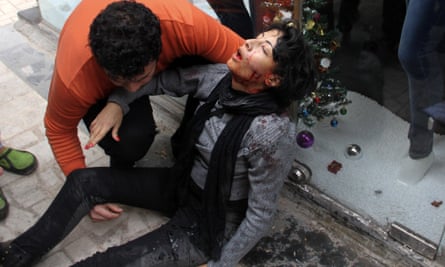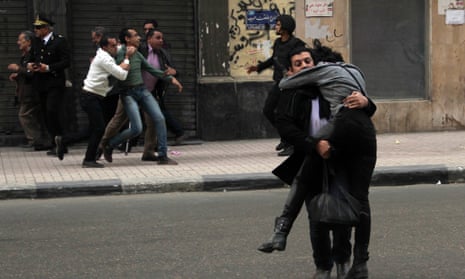The editor of Egypt’s flagship state newspaper has taken the unexpected step of directly condemning the cold-blooded murder of an unarmed female protester, whose death in Cairo sparked worldwide media coverage this weekend, in an unusually critical front-page editorial that also had sharp words for Egypt’s president, Abdel Fatah al-Sisi.
State and private media alike in Egypt have largely backed the government’s crackdown on dissent, with protesters often previously portrayed in the media as traitors, and the editors of Egypt’s 17 main newspapers jointly promising late last year to avoid criticism of the country’s key institutions.
But the case of 31-year-old protester Shaimaa al-Sabbagh, who eyewitnesses said was shot by masked policemen on Saturday after they attacked a small procession aiming to lay flowers in memory of Egypt’s derailed revolution, has sparked a more sympathetic reaction from Egypt’s main state newspaper, hinting at splits in the Egyptian establishment.
Stark images and videos of Sabbagh as she sat dying – propped up by a friend, and with blood streaking down her face prompted reactions of horror and sympathy in global and local media alike. Videos and photographs showed masked policemen shooting at her unarmed procession, making it harder for the police and its backers in the Egyptian media to explain away her death.

“I am sure the police did this,” said one witness, Azza Soliman, a 48-year-old lawyer who was sitting at a nearby cafe when the attack began, and who has published a full account of what happened.
Nevertheless, police spokesman Hany Abdel Latif and his allies in private media initially blamed her death on Muslim Brotherhood infiltrators, suggesting that the state would try to explain away Sabbagh’s death in the same fashion it has the killing of thousands of other political dissidents in recent years.
But the strikingly critical front-page editorial on Monday’s edition of al-Ahram, often considered the voice of the government, laid the blame squarely with the police, and suggested that there is division within the ranks of government about how much state repression should be tolerated.
Ahram’s editor, Ahmed Sayed Naggar, wrote: “The invulnerable facts conveyed by the eyewitness accounts from Shaimaa’s partners in the demonstration, and by the footage of her killing, clearly indicate the killer, the misuse of power and a failure to implement the law.”
In his most eye-catching paragraph, Naggar implicitly criticised Sisi, calling on him to ensure that justice was served in Sabbagh’s case. The responsibility for doing so, he wrote, is “on all our shoulders, first and foremost on the elected president entrusted to protect the souls of this nation’s sons from the abuse of power”.
The unusually forthright article, in a newspaper that usually stays close to the state line, was unlikely to have been published at the request of state officials, said Hisham Kassem, the founding publisher of Egypt’s first private broadsheet.
But Kassem said it nevertheless reflected the thinking of Sisi’s camp, which acknowledges that excessive police violence may prompt further unrest if left unchecked.
“It’s not because the president loves democracy,” said Kassem. “But he’s an information man, and the information he’s getting says that this country will blow if these kind of events continue.
“The police are acting in an almost renegade manner – but at least with the president there’s an awareness that there will be a political cost if it continues. What happened near the square is one example of this – and there is fury in the presidency about how damaging this behaviour could be.”
But the subsequent treatment of some of the eyewitnesses has left them doubtful that justice will be served. Azza Soliman voluntarily approached prosecutors to give them her testimony – and despite having taken no part in the protest, the same prosecutors ordered her to be arrested pending investigation herself.
“The regime has decided to shut up all voices, even those who say the truth through a testimony,” said Soliman in an emailed statement.
Elsewhere in Egypt, the relatively sympathetic coverage afforded to Sabbagh, a secular socialist, has upset Islamists whose dead colleagues rarely receive such compassion. The day before Sabbagh’s death, another female protester, 17-year-old Sondos Ridha, was also killed. But perhaps because of her association with supporters of the Muslim Brotherhood, a group hated by the state and its secular opposition alike, Ridha’s death did not attract the same level of outrage – and nor did those who died at Islamist-led protests in northern Cairo on Sunday.
“She’s Muslim Brotherhood, and people don’t care about them anymore,” said Mohamed Mourad, a student activist who demonstrated in northern Cairo. “The media legitimised their killings.”
Additional reporting by Manu Abdo







Comments (…)
Sign in or create your Guardian account to join the discussion